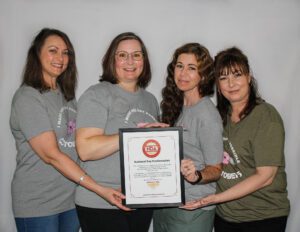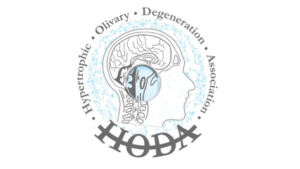Before you read on, make sure to check out Part 1 of our interview with Christina (“Chris”) Coates. In Part 1, we discussed Chris’ Cavernous Malformation, surgery, and diagnostic journey to hypertrophic olivary degeneration (HOD). We also talk about what HOD is, its symptoms, and its overall impact. Today, we’re discussing Chris’ formation of the Hypertrophic Olivary Degeneration Association (HODA), as well as poignant advice for others on their journey.
Combating HOD Myths
Hypertrophic olivary degeneration is still poorly understood within the broader medical field. As a result, healthcare providers have perpetuated some potentially harmful myths regarding HOD. For example, many doctors believe that HOD is an incidental finding that will resolve on its own. Considering the experiences of patients so far, however, this does not seem to be accurate. As Chris explains:
“People come to me and say that their HOD will be resolved, or that mine will, and I have to say that isn’t true. Doctors keep telling patients that HOD will go away, but that’s not what we have seen so far.”
Addressing these misconceptions and providing people with more accurate and factual information and resources is one of her main goals—and one of the key reasons why she formed the Hypertrophic Olivary Degeneration Association!
Forming HODA
After her diagnosis, Chris was searching for support and community—but there didn’t seem to be anything specific to HOD outside of certain online support groups. Within these groups, Chris connected with a caregiver who had experience with running nonprofits.

Driven to make a change, Chris dove in headfirst. She filled out the legal paperwork, set up the website, and formed a board with four other members. The Hypertrophic Olivary Degeneration Association (HODA) was born! Says Chris:
“One big question that drives us is how do we best support our patients and our caregivers? A rare disease diagnosis can send you into a very dark place. When I was diagnosed, I felt completely out of my element. I was convinced that I’d die before 50. It felt like I was lost, dumped into the middle of the ocean with a bucket of chum during the height of shark season. I don’t want anyone else to end up there, so I’m doing all I can to offer support. Honestly, mental health support is of the utmost importance.”
In addition to providing patients with an avenue for non-judgmental discussion and conversation, the HODA is getting ready to launch “No Judgment Group Art Therapy.” Materials will be sent out to those who need them, and people can join in on a virtual call to do art together. The theme of the first art therapy experience is “Show Your Stripes for Rare Disease Day.”
Other Initiatives
Outside of the more patient-centric focus, the HODA is also working on getting HOD into the ICD-10 to start being tracked, offering more information to doctors, and implementing more coding. Chris also hopes that fundraising and grant seeking will kickstart the path towards research. In terms of research, Chris already has some questions she would love to see explored:
- Why do some people with HOD have ataxia and others, like Chris, do not?
- Some individuals with cavernous malformations located in the brainstem and/or Cerebellum do just fine after surgery with no lasting effects. Why do they not develop HOD when others, like Chris, do?
- What is the disease progression? Will the olives continue to degenerate until the structures are completely gone? If the condition starts on one side, will it spread or stagnate?
Of course, working towards treatments—and a potential cure—would be amazing. But identifying the underlying mechanisms of the disease, and chipping away a bit at a time, could provide a more nuanced understanding.
Providing Support and Advice
When Chris thinks back on her life, she sees herself in different stages. Versions, as she describes them to me. Seeing yourself as a version could be helpful in coming to terms with your diagnosis. She explains:
“It’s okay to honor and let go of the person you were before. That was just the first version of you. You have to come to adapt and come to terms with the second version of yourself. The first version of myself was rad. She was so strong and helped to carry me through the hardships. I’m letting go of my old life, but I’m going to trudge forward and find purpose in this new life. I’m still here—and so are you. Let go of what you thought your life was going to be, because it’s going to be different but that doesn’t mean it’s going to be bad.”
If you are living with hypertrophic olivary degeneration, or are a caregiver for someone with HOD, you are not alone. Chris would love to speak with you. If you would like to connect with Chris, please contact [email protected] and she would be happy to facilitate that.







